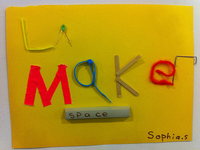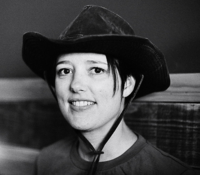Monday, January 14, 2013
Creating A Culture Of DIY Hacking, with Tara Tiger Brown and LA MakerSpace

What is a hackerspace, and why might having them available in the area help the tech community? The idea is a community space where people can come together, learn something from one another, build that electronics project, software, or even arts and crafts, in a supported environment. One hackerspace coming together in Los Angeles, LA Makerspace (www.lamakerspace.com) is being put together by Tara Tiger Brown. We caught up with Tara--who some might know from her efforts on RepresentLA--on what LA Makerspace is all about--and how places like LA Makerspace are key to bringing the technology and technical community together.
What is LA Makerspace?

Tara Tiger Brown: Makerspace is a kid-friendly hacker space. Essentially, it's a community space where you can work on your DIY projects, and learn news skills like programming, how to make pallet furniture, and how to paint. You can learn from others in the space, or take a class. It's membership based, and the goal for us is to eventually be sustainable through membership, by putting on events and classes, and so on. We're in fundraising mode right now, because we need to buy expensive equipment such as a laser cutter, a 3D printter, and lots of other stuff like that so people can work on their projects. With most hackerspaces, the community will share tools and stuff, but these are the bigger and more interesting tools people couldn't otherwise afford or find space for. The nice think about hackerspaces like ours, is we also provide a space to leave your projects and stuff, where you might not otherwise have space at your home. How we differentiate, is we're kid friendly, and we have supervision during open project times. We feel like we're much more focused on safety than an adult-only hackerspace. We also require parents to come for kids who are under thirteen, except in special circumstances. Plus, everyone on our board of directors and who we are hiring will have CPR training, background checks, and we're all about as much safety for kids as possible.
Where'd the idea come from, and why did you decide to help organize this?
Tara Tiger Brown: It was a couple of different things. My husband started Crashspace, the first hackerpsace in LA. But, I found that I wasn't every going to the space, which was just too far on the eastside. I had just had our son, and I wanted someplace I could take him and work on projects with him. Honestly, Crashspace was also just too cramped for me. I had just started a girl's tech group, and I was looking for a place to hang out, and that space wasn't working for us. I wanted my own space, which was a little more central to downtown. Plus, I actually work with Dale Daughtery, Mark Fraunfelder and AnnMarie Thomas--who you might know through MAKE magazine--through my day job, at UC Irvine's Digital Learning Research Hub, where we work with research groups across different countries. We've learned a lot through that resarch on how kids learn, and how people learn best, and it's through connected learning and passionate interests. It made a lot of sense to me to be in a space where I'd be around people working on really cool stuff. I actually learn things better on YouTube from kids, than from adults, and I've had many other people say the same thing--it's not just me. One day, I wrote a blog post seeing if anyone else was into this, and people said yea--let's set up a meeting at Crashspace. We ended up with a room full of people interested in the same thing. We followed the hackerspace model, and met up with people every two weeks, talking about what we wanted to do, what kind of events we'd want to hold, what you'd want in your own space, and then held our first event, which was very successful. It was a youth hack jam, which we held at Wildwood School, and had tons of sponsors, and I think we had over 120 people come out for it, parents and kids. We kept on hosting events, when people allowed us to use their space, but it was limiting, because we always had to move around, and we wouldn't be able to have equipment like a laser cutter. That motivated us at that point to get our own space.
For those of us not fully up to speed on a hackerspace, can you talk about what the idea is behind them?
Tara Tiger Brown: It's a community space where you collaborate on projects and share your tools with other people. I think one of the very first was in Vienna, Metal Labs, which was in the basement of a building. The projects there are very varied, ranging from very hard core geeks in there doing this that even I don't know what they're doing, to people working on Arduino stuff, or film stuff. One of the girls there was doing a project that focuses on wearable technology. There's even a hacker space in the Bay Area called Mothership HackerMoms, which is creating a hackerspace for mothers and kids, and is more craft oriented.
What's your background, and what drove you to get involved in this area?
Tara Tiger Brown: My background is in software. I have been leading software projects for my entire career. I have always tinkered around and figured out how to do things on my own. I've done things like figured out how to write my own iOS app, played around with Arduino. I've always worked on building community, kind of the things like RepresentLA stuff that I did. This is the same idea, where I can be around other people who I can work on this kind of stuff with, who like to share tools, and so that I don't have to buy all this stuff myself. I think because the work my husband has done, and because I've always been around people in technology for my entire career, it just kind of happened.
Does LA have the density of technical folks to keep these kind of hackerspaces alive? We often hear people complain about the environment in LA for technical folks.
Tara Tiger Brown: There are plenty of technical people in Los Angeles. But, what I also love about LA is it's diverse. It's not like when I lived in San Francisco, when I couldn't find anybody who wasn't technical. One thing different about Makerspace, is it's not all about technical projects. It's about wanting to work on some sort of project by yourself, and not buy it from a store. You want to take something apart and see how it works. That is even true of things like knitting, for example. They were the first reverse engineers. They'd look at something, and then they'd take it apart to reverse engineer it so they could make their own pattern. You don't have to be technical in that you know how to program or understand circuits or how electronics works. We even have people in the fashion industry in Los Angeles, who are maybe not so technical. But they're interested in textiles, and are interested in bringing fashion to life through wearable technology. In terms of technical folks, we have all of these universities, and I'm constantly pinged by engineers from the local universitities, from places like JPL, or from SpaceX. There are tons. There are also all of these software startups. If anyone tells me they can't find technical people in LA, they're not being very resourceful.
Thanks!